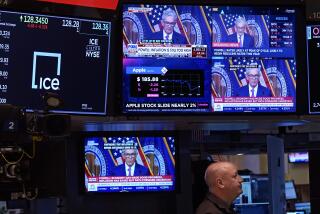U.S. Money Supply Soars $9.4 Billion, Fed Reports
- Share via
NEW YORK — The Federal Reserve Board reported Thursday that the nation’s basic money supply shot up $9.4 billion in early November, nearly double the increase that had been expected by financial analysts.
In the credit markets, bond prices extended their declines for the day and short-term interest rates inched higher after the report was released at 4:30 p.m. EST.
But economists said they doubt that the money surge will prompt the central bank to tighten its credit policy because doing so would endanger an already sluggish economy.
“This could hurt the market for a day or two, but I don’t think it means very much,” said David Hale, chief economist for Kemper Financial Services in Chicago.
He said he expects economic figures over the next few weeks to show that the economy remains weak and that the Fed will eventually relax its money policy to stimulate economic growth.
The Fed reported that the measure of the basic money supply known as M1 rose to a seasonally adjusted average of $712.8 billion in the week ended Nov. 10 from $703.4 billion in the previous week. M1 includes cash in circulation, deposits in checking accounts and non-bank travelers checks.
For the latest 13 weeks, M1 averaged $697.1 billion, a 15.8% seasonally adjusted annual rate of gain from the previous 13 weeks.
The central bank tries to allow enough money growth to permit the economy to expand at a steady but non-inflationary rate. It has said it would like to see M1 grow 3% to 8% from the fourth quarter of 1985 through the final quarter of 1986. But M1 has exceeded these targets for months without a surge in inflation, and many economists suggest that M1 no longer carries the importance it once did.
More to Read
Inside the business of entertainment
The Wide Shot brings you news, analysis and insights on everything from streaming wars to production — and what it all means for the future.
You may occasionally receive promotional content from the Los Angeles Times.










